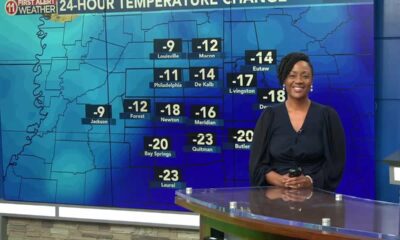Mississippi Today
Rollin’ on the river: How the Mississippi flows through song and still inspires today

MARQUETTE, Iowa – It was just before sunset on the Mississippi River, the day’s last bits of golden light dancing on the water, when four members of the band Big Blue Sky picked up their instruments for one of their defining songs.
During the summer, the group plays Friday nights for Maiden Voyage Tours, a northeast Iowa riverboat company. Its 40-some passengers that evening had been sharing bottles of wine and hearing tales of Mississippi River history as they cruised along, speedboats occasionally racing by on either side.
Then the boat captain pulled over to an island and cut the motor. It was time for the water song.
Moving and unforgettable, “Water Song” urges listeners to think about how they treat the natural resource, so vital for life on earth. The tune was written in 2015 and came together in minutes, recalled Big Blue Sky singers and songwriters Jon Stravers and Sophia Landis. Much of the group’s music is about the river and the surrounding region, a place of curiosity, adventure and solace for Stravers and his late son, Jon-Jon.
Big Blue Sky’s work adds to a centuries-long tradition of music inspired and transported by the Mississippi River. The river’s role as a major shipping artery and a force of nature, as well as its historical and cultural significance to the nation, make it an easy thing to write about. And riverboats not altogether different from this one carried songs north and south, spreading jazz and the delta blues across the heart of the country.
Most importantly, the music describes people’s personal connections to the river — something intensely evident in Stravers’ words on the boat.
In song, he and Landis rhapsodized. In speaking, he kept it simple: “This is a good stretch of the river. It’s important. And people love it.”

Mississippi River moved and shaped jazz, delta blues
Perhaps no style of music is as intertwined with the Mississippi River as the delta blues, rooted in the musical traditions of enslaved Black Americans who were forced to work long hours in the fields of the Mississippi Delta region. Though slavery had technically ended, many Black Americans remained in unfair and oppressive working conditions at the turn of the 20th century.
Unlike gospel music sung in church, blues reflected their real lives and real feelings, said Maie Smith, group tour manager and operations manager at the Delta Blues Museum in Clarksdale, Mississippi.
“Delta blues music is a music that works from the heart to the outside,” Smith said. “It starts with your most inner being, and helps to lift you up and rise you above whatever circumstances you were in.”
Lots of delta blues musicians worked on the river, Smith said, including those forced to build levees to protect fields from floodwaters. They endured the Great Mississippi River Flood of 1927, which killed upwards of a thousand people and displaced almost 640,000 people from Illinois to Louisiana. Many songs were written about this historic disaster and other river floods, including Charley Patton’s “High Water Everywhere,” Barbecue Bob’s “Mississippi Heavy Water Blues,” Bessie Smith’s “Backwater Blues” and Big Bill Broonzy’s “Southern Flood Blues.”
But the river also provided opportunities for blues musicians to travel, taking their songs with them. Blues and later jazz music came north to Memphis, Kansas City and Chicago, building a following and mixing with other music styles. Today, blues riffs underpin much of American popular music, Smith said, like rock and roll and hip hop.
Music was moving on the Mississippi even before then — during the so-called “golden age of steamboats” in the 19th century. Thousands of steamboats traveled the river and its major tributaries during that time, said Steve Marking, a river historian and guest performer for American Cruise Lines on its Mississippi River cruises.
The boats took on passengers as well as freight, and companies sought to hire the best musicians to entice people to pay to board, Marking said. Later, even influential jazz musician Louis Armstrong performed for a few years on the Streckfus Steamboat Line.
Other forms of music that arose and were popularized on the river include ragtime in St. Louis and river folk music that featured banjo, fiddle and percussion. Dixieland, a form of jazz, and country music also owe a debt to the river.

Why capture the Mississippi River in song?
Rivers in general “have inspired almost as many songs as love,” Marking said.
Many people have some sort of connection with them, whether it’s traveling them by boat or simply watching them run. Marking pointed to the song “Watchin’ the River Go By,” by John Hartford, which depicts two people who get together each night on the porch to watch the Ohio River. It’s an experience anyone, young or old, can relate to, he said (well, maybe not completely — the people in the song do so in the nude).
But more than lakes, forests or prairies, rivers are captured in song over and over again. Why?
It could be their heavy symbolism. For Marking, rivers signify the passage of time, reminding us of our journey through life.
“If you’re standing on the shore,” he said, “upstream is the past, downstream is the future.”
Rivers also make a connection — between places, or even between the past and the future.
The musicians who still travel the river today are helping make that connection, Marking said, including the ones who make up Big Blue Sky. He described taking the boat tour and listening to them play “Water Song” as “one of the top five events of my entire life.”
It’s easy to see why. The group’s music both honors the river’s musical traditions and adds something new: an eye toward its ecological importance. In between songs, passengers got to hear about Stravers’ decades of bird research on this stretch of the river, including monitoring of the cerulean warbler, one of the rarest nesting warblers in Iowa. They stopped to watch a beaver on an island waddle through the sand to make his way back to the water. And they were granted what the captain called one of the best sunsets of the summer: a bright, show-stopping pink.
Though most of their songs evolve over time, Stravers said, “Water Song” pretty much gets played the same every time. The exception is in his echo to Landis’s main melody, where he regularly inserts the name of whatever water body they’re playing on to remind listeners they need it to live.
Sacred Mississippi River water, indeed.
Want to hear more? Check out this Mississippi River playlist!
This story is a product of the Mississippi River Basin Ag & Water Desk, an independent reporting network based at the University of Missouri in partnership with Report for America, with major funding from the Walton Family Foundation.
This article first appeared on Mississippi Today and is republished here under a Creative Commons license.![]()
Mississippi Today
On this day in 1997


Dec. 22, 1997

The Mississippi Supreme Court upheld the conviction of white supremacist Byron De La Beckwith for the 1963 murder of Medgar Evers.
In the court’s 4–2 decision, Justice Mike Mills praised efforts “to squeeze justice out of the harm caused by a furtive explosion which erupted from dark bushes on a June night in Jackson, Mississippi.”
He wrote that Beckwith’s constitutional right to a speedy trial had not been denied. His “complicity with the Sovereignty Commission’s involvement in the prior trials contributed to the delay.”
The decision did more than ensure that Beckwith would stay behind bars. The conviction helped clear the way for other prosecutions of unpunished killings from the Civil Rights Era.
This article first appeared on Mississippi Today and is republished here under a Creative Commons license.![]()
Mississippi Today
Medicaid expansion tracker approaches $1 billion loss for Mississippi

About the time people ring in the new year next week, the digital tracker on Mississippi Today’s homepage tabulating the amount of money the state is losing by not expanding Medicaid will hit $1 billion.
The state has lost $1 billion not since the start of the quickly departing 2024 but since the beginning of the state’s fiscal year on July 1.
Some who oppose Medicaid expansion say the digital tracker is flawed.
During an October news conference, when state Auditor Shad White unveiled details of his $2 million study seeking ways to cut state government spending, he said he did not look at Medicaid expansion as a method to save money or grow state revenue.
“I think that (Mississippi Today) calculator is wrong,” White said. “… I don’t think that takes into account how many people are going to be moved off the federal health care exchange where their health care is paid for fully by the federal government and moved onto Medicaid.”
White is not the only Mississippi politician who has expressed concern that if Medicaid expansion were enacted, thousands of people would lose their insurance on the exchange and be forced to enroll in Medicaid for health care coverage.
Mississippi Today’s projections used for the tracker are based on studies conducted by the Institutions of Higher Learning University Research Center. Granted, there are a lot of variables in the study that are inexact. It is impossible to say, for example, how many people will get sick and need health care, thus increasing the cost of Medicaid expansion. But is reasonable that the projections of the University Research Center are in the ballpark of being accurate and close to other studies conducted by health care experts.
White and others are correct that Mississippi Today’s calculator does not take into account money flowing into the state for people covered on the health care exchange. But that money does not go to the state; it goes to insurance companies that, granted, use that money to reimburse Mississippians for providing health care. But at least a portion of the money goes to out-of-state insurance companies as profits.
Both Medicaid expansion and the health care exchange are part of the Affordable Care Act. Under Medicaid expansion people earning up to $20,120 annually can sign up for Medicaid and the federal government will pay the bulk of the cost. Mississippi is one of 10 states that have not opted into Medicaid expansion.
People making more than $14,580 annually can garner private insurance through the health insurance exchanges, and people below certain income levels can receive help from the federal government in paying for that coverage.
During the COVID-19 pandemic, legislation championed and signed into law by President Joe Biden significantly increased the federal subsidies provided to people receiving insurance on the exchange. Those increased subsidies led to many Mississippians — desperate for health care — turning to the exchange for help.
White, state Insurance Commissioner Mike Chaney, Gov. Tate Reeves and others have expressed concern that those people would lose their private health insurance and be forced to sign up for Medicaid if lawmakers vote to expand Medicaid.
They are correct.
But they do not mention that the enhanced benefits authored by the Biden administration are scheduled to expire in December 2025 unless they are reenacted by Congress. The incoming Donald Trump administration has given no indication it will continue the enhanced subsidies.
As a matter of fact, the Trump administration, led by billionaire Elon Musk, is looking for ways to cut federal spending.
Some have speculated that Medicaid expansion also could be on Musk’s chopping block.
That is possible. But remember congressional action is required to continue the enhanced subsidies. On the flip side, congressional action would most likely be required to end or cut Medicaid expansion.
Would the multiple U.S. senators and House members in the red states that have expanded Medicaid vote to end a program that is providing health care to thousands of their constituents?
If Congress does not continue Biden’s enhanced subsidies, the rates for Mississippians on the exchange will increase on average about $500 per year, according to a study by KFF, a national health advocacy nonprofit. If that occurs, it is likely that many of the 280,000 Mississippians on the exchange will drop their coverage.
The result will be that Mississippi’s rate of uninsured — already one of the highest in the nation – will rise further, putting additional pressure on hospitals and other providers who will be treating patients who have no ability to pay.
In the meantime, the Mississippi Today counter that tracks the amount of money Mississippi is losing by not expanding Medicaid keeps ticking up.
This article first appeared on Mississippi Today and is republished here under a Creative Commons license.![]()
Mississippi Today
On this day in 1911


Dec. 21, 1911

Josh Gibson, the Negro League’s “Home Run King,” was born in Buena Vista, Georgia.
When the family’s farm suffered, they moved to Pittsburgh, and Gibson tried baseball at age 16. He eventually played for a semi-pro team in Pittsburgh and became known for his towering home runs.
He was watching the Homestead Grays play on July 25, 1930, when the catcher injured his hand. Team members called for Gibson, sitting in the stands, to join them. He was such a talented catcher that base runners were more reluctant to steal. He hit the baseball so hard and so far (580 feet once at Yankee Stadium) that he became the second-highest paid player in the Negro Leagues behind Satchel Paige, with both of them entering the National Baseball Hame of Fame.
The Hall estimated that Gibson hit nearly 800 homers in his 17-year career and had a lifetime batting average of .359. Gibson was portrayed in the 1996 TV movie, “Soul of the Game,” by Mykelti Williamson. Blair Underwood played Jackie Robinson, Delroy Lindo portrayed Satchel Paige, and Harvey Williams played “Cat” Mays, the father of the legendary Willie Mays.
Gibson has now been honored with a statue outside the Washington Nationals’ ballpark.
This article first appeared on Mississippi Today and is republished here under a Creative Commons license.![]()
-

 News from the South - Arkansas News Feed7 days ago
News from the South - Arkansas News Feed7 days agoFaith-inspired ministry opens health clinic in Little Rock
-

 News from the South - Florida News Feed6 days ago
News from the South - Florida News Feed6 days ago‘Dirty Dancing,’ ‘Beverly Hills Cop,’ ‘Up in Smoke’ among movies entering the National Film Registry
-

 Our Mississippi Home6 days ago
Our Mississippi Home6 days agoThe Meaning of the Redbird During the Holiday Season
-

 Mississippi Today4 days ago
Mississippi Today4 days agoMississippi PERS Board endorses plan decreasing pension benefits for new hires
-

 Local News2 days ago
Local News2 days agoHard Rock Hotel & Casino Biloxi Honors Veterans with Wreath-Laying Ceremony and Holiday Giving Initiative
-

 News from the South - North Carolina News Feed2 days ago
News from the South - North Carolina News Feed2 days agoSocial Security benefits boosted for millions in bill headed to Biden’s desk • NC Newsline
-

 News from the South - Missouri News Feed3 days ago
News from the South - Missouri News Feed3 days agoCould prime Albert Pujols fetch $1 billion in today's MLB free agency?
-

 Mississippi News Video3 days ago
Mississippi News Video3 days ago12/19- Friday will be breezy…but FREEZING by this weekend































